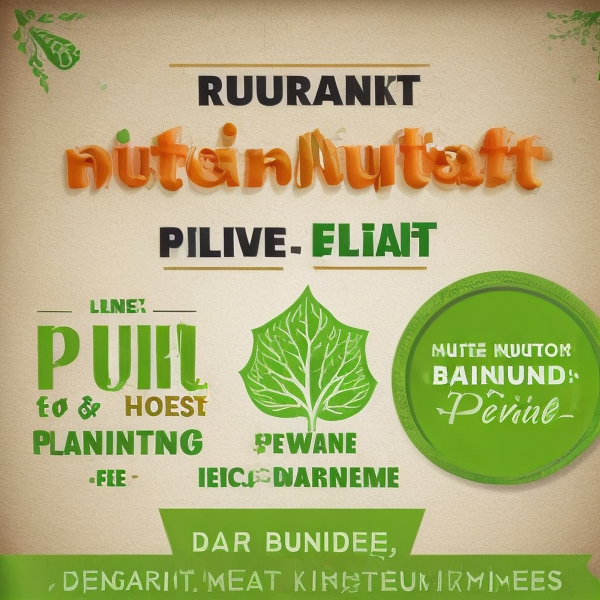Key Nutrients for a Balanced Plant-Based Diet

Title: Key Nutrients for a Balanced Plant-Based Diet
Introduction
A plant-based diet is becoming increasingly popular, not only for its numerous health benefits but also for its environmental impact. By consuming primarily fruits, vegetables, whole grains, legumes, nuts, and seeds, individuals can reduce their risk of chronic diseases such as heart disease, type 2 diabetes, and certain types of cancer. However, it’s important to ensure that you are getting all the necessary nutrients in adequate amounts to maintain optimal health. In this article, we will discuss some key nutrients that are essential for a balanced plant-based diet.
Protein
One of the most common concerns when transitioning to a plant-based diet is protein intake. Protein is essential for building and repairing tissues, producing enzymes and hormones, and supporting immune function. While animal products are high in protein, plant-based sources like beans, lentils, tofu, tempeh, seitan, and quinoa are also excellent sources of protein. Aim to include at least one serving of these protein-rich foods at each meal.
Calcium
Calcium is crucial for strong bones and teeth, muscle contraction, and blood clotting. Dairy products are often the primary source of calcium in Western diets, but there are many plant-based alternatives. Tofu, fortified plant milk (such as almond, soy, or oat milk), leafy green vegetables, and fortified foods like cereals and orange juice are great sources of calcium. It’s recommended that adults consume around 1,000 mg of calcium per day.
Iron
Iron plays an important role in transporting oxygen throughout the body and is found in hemoglobin, the protein in red blood cells. Iron deficiency can lead to fatigue, weakness, and shortness of breath. While iron from animal sources is more easily absorbed by the body, plant-based sources of iron include beans, lentils, tofu, tempeh, spinach, and fortified cereals. To increase iron absorption, eat vitamin C-rich foods with plant-based iron sources, such as citrus fruits, tomatoes, bell peppers, and broccoli.
Vitamin B12
Vitamin B12 is essential for red blood cell formation, DNA synthesis, and neurological function. This water-soluble vitamin is mainly found in animal products, making it challenging for vegans to obtain sufficient amounts through diet alone. Fortunately, many plant-based milks, breakfast cereals, and nutritional yeast products are fortified with vitamin B12. If you follow a strictly plant-based diet, consider taking a supplement containing vitamin B12 or consult with a registered dietitian to determine if supplementation is necessary.
Omega-3 Fatty Acids
Omega-3 fatty acids have anti-inflammatory properties and are important for brain function, heart health, and eye health. While fish and seafood are the best-known sources of omega-3s, plant-based sources include flaxseeds, chia seeds, walnuts, and canola oil. Algal oil, derived from algae, is also a vegan source of omega-3s. Aim to consume about 1.6 grams of combined EPA and DHA (two forms of omega-3s) per day.
Vitamin D
Vitamin D plays a crucial role in bone health, immune function, and cell growth. While sun exposure is the primary way our bodies produce vitamin D, it can also be obtained through limited amounts of fortified foods and supplements. Some plant-based milk alternatives, such as fortified soy milk and rice milk, are good sources of vitamin D. If you don’t get enough sun exposure or consume enough fortified foods, consider taking a vitamin D supplement.
Zinc
Zinc is an essential mineral involved in immune function, wound healing, and protein synthesis. While meat and poultry are the richest sources of zinc, plant-based sources include beans, lentils, tofu, tempeh, nuts, and seeds. To maximize your zinc intake on a plant-based diet, eat foods high in both phytates and non-heme iron, as phytates can inhibit the absorption of zinc. Soaking and sprouting nuts and legumes, and pairing them with foods high in vitamin C, can help improve zinc absorption.
Conclusion
By including a variety of nutrient-dense plant-based foods in your diet, you can ensure that you are meeting your daily requirements for key nutrients. Remember to plan ahead, read labels carefully, and consider working with a registered dietitian to create a personalized eating plan that meets your individual needs and preferences. With proper planning and attention to nutrition, a plant-based diet can provide numerous health benefits while promoting sustainable living practices.
